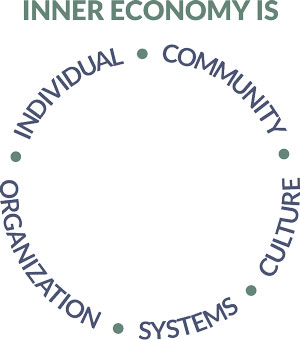Our Story
The Institute for Inner Economy was founded by Lisa Berkley in 2014 based upon her development of the Inner Economy Model and more than 25 years as a consultant and peacemaker.

Background
Initially explored in Israel/Palestine during the second intifada, the concept of Inner Economy and the methodology behind it was tested through a series of peace building programs and trainings. The programs were measurably successful; in a 2013 study (10 or more years after program completion), more than 80% of program participants surveyed felt the lessons and experiences they had during their training continued to affect their state of mind and enabled them to live more authentic, fulfilling, grounded, and emotionally responsible lives. Notably, a little over 60% said that even ten-years and many “conflicts” later, they still felt compassion for their “enemies.” (Berkley, L. (2014). Looking Back, Looking Forward: 10 Years Later, A Look at the Effects of the Joy of Life Program & the Application of Inner Economy to Societal Healing in Israel/Palestine. Unpublished Manuscript, Antioch University, Yellow Springs, OH)

Our Goals
Inner Economy is a proven framework for positive change in policy development, implementation, peacemaking, and economic stability as it defines the impact an individual has on their community and society. The Inner Economy model lays the foundation for achieving the the 8 pillars of Positive Peace (Well-Functioning Government, Equitable Distribution of Resources, Free Flow of Information, Good Relations with Neighbors, High Levels of Human Capital, Acceptance of the Rights of Others, Low Levels of Corruption, and Sound Business Environment) as it enables individuals to understand their direct impact on improving their community.
Traditionally, when reference to our global or national economic well-being is made, we are referring to such things as GDP or GNP, both of which are driven and maintained by the market forces which keep them healthy. IIE refers to this as our external economy. The inner economy is like-wise driven by certain forces and requires specific attitudes and behaviors to be healthy. Both the external and internal economies are critical for healthy governance as we repair broken systems of governance and move toward a global economy and people.
A thriving inner economy enables us to shift from militaristic models like “deterrence and assurance” or “no first strike” to a culture of policy making that is rooted in 360 diplomacy, positive psychology, and positive human potential. Inner Economy has the proven potential to be useful at the federal, state, and city level of everyday governance, assisting policy makers in drafting and implementing more effective policy with long-term success as well as better communication and compassion with constituents.
It Is Time
The United States has, more or less, been exercising the same policy and governance models for the last 50 years. The rapid growth of globalization and technological connectivity have made most aspects of these models ineffective at best and destructive at worst. In a time of pervasive uncertainties and complex challenges, it is time for a new way of working together. We see the need to adopt new strategies, developed and organized in the spirit of cooperation and collaboration. Many policymakers and governing officials, in fact, have expressed interest in positive peace remodeling of their strategy, but they have not yet had an organization to guide and consult them through the process. This is where we come in.
Inner Economy expands a leader’s understanding of themselves and their role in relationship to their constituency as well as their impact in the world. When applied to the collective, it reflects the non-tangible inner workings of a community; that is, the way people feel and interact within themselves, with other members of the community, and the community itself (i.e. businesses, governance, school systems, healthcare, cultural institutions, and the natural environment.) With this solid foundation built in leadership, logic and experience demonstrates that it will become the norm of that leaders area, constituency, governing body, etc. Inner economy then spreads, and we see new strategies as being not possible, but necessary.
